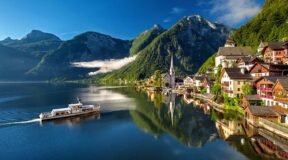Austria is a popular travel destination known for its rich cultural heritage, stunning landscapes, and vibrant cities. Here’s an overview of what makes Austria a great place to visit:
Major Cities
- Vienna: The capital city, Vienna, is renowned for its imperial history, baroque architecture, and musical heritage. Key attractions include:
- Schönbrunn Palace: A former imperial summer residence with beautiful gardens.
- Hofburg Palace: The former imperial winter residence, now housing museums and the Austrian President's offices.
- St. Stephen's Cathedral: An iconic Gothic cathedral in the heart of the city.
- Vienna State Opera: One of the world’s leading opera houses.
- MuseumsQuartier: A cultural district with numerous museums and art galleries.
- Salzburg: Famous as the birthplace of Mozart and the setting for "The Sound of Music."
- Hohensalzburg Fortress: One of the largest medieval castles in Europe.
- Mirabell Palace and Gardens: Known for their beautiful gardens and stunning views of the fortress.
- Salzburg Cathedral: A baroque architectural masterpiece.
- Mozart's Birthplace: A museum dedicated to the life and works of Wolfgang Amadeus Mozart.
- Innsbruck: Known for its alpine scenery and winter sports.
- Innsbruck's Old Town: Featuring the Golden Roof and medieval buildings.
- Hofkirche: A gothic church with Emperor Maximilian I’s tomb.
- Nordkette Cable Car: Offering stunning views of the Alps and the city.
Natural Attractions
- The Austrian Alps: A paradise for skiers, hikers, and nature lovers. Popular regions include:
- Tyrol: Known for its ski resorts like Kitzbühel and St. Anton.
- Salzkammergut: A lake district with picturesque towns like Hallstatt.
- Grossglockner High Alpine Road: A scenic drive that offers breathtaking views of Austria’s highest mountain, Grossglockner.
- Danube River: Cruises along the Danube offer views of rolling hills, vineyards, and historic towns like Dürnstein and Melk.
Cultural Experiences
- Music and Festivals: Austria has a rich musical heritage, being the home of composers like Mozart, Strauss, and Schubert.
- Vienna Philharmonic Orchestra: World-famous orchestra with regular performances.
- Salzburg Festival: A renowned festival of music and drama held every summer.
- Traditional Cuisine: Austrian food is hearty and delicious.
- Wiener Schnitzel: A breaded and fried veal cutlet.
- Sachertorte: A famous chocolate cake from Vienna.
- Apfelstrudel: A traditional Austrian apple pastry.
- Wine Regions: The Wachau Valley and Burgenland are known for their excellent wines, especially Grüner Veltliner and Riesling.
Historical Sites
- Melk Abbey: A Benedictine abbey overlooking the Danube River, known for its magnificent baroque architecture.
- Eisriesenwelt Ice Cave: The largest ice cave in the world, located near Salzburg.
- Mauthausen Memorial: A poignant reminder of Austria’s history during World War II.
Practical Tips
- Language: German is the official language, but English is widely spoken, especially in tourist areas.
- Currency: The Euro (EUR) is used.
- Transportation: Austria has an efficient public transport system, including trains, buses, and trams. The ÖBB (Austrian Federal Railways) is known for its reliability.
Best Time to Visit
- Winter (December to March): Ideal for skiing and winter sports.
- Spring (April to June) and Autumn (September to October): Great for sightseeing with mild weather and fewer tourists.
- Summer (July to August): Best for outdoor activities and festivals, but it’s also the peak tourist season.
Austria offers a diverse range of experiences, making it a versatile destination for various types of travelers.

